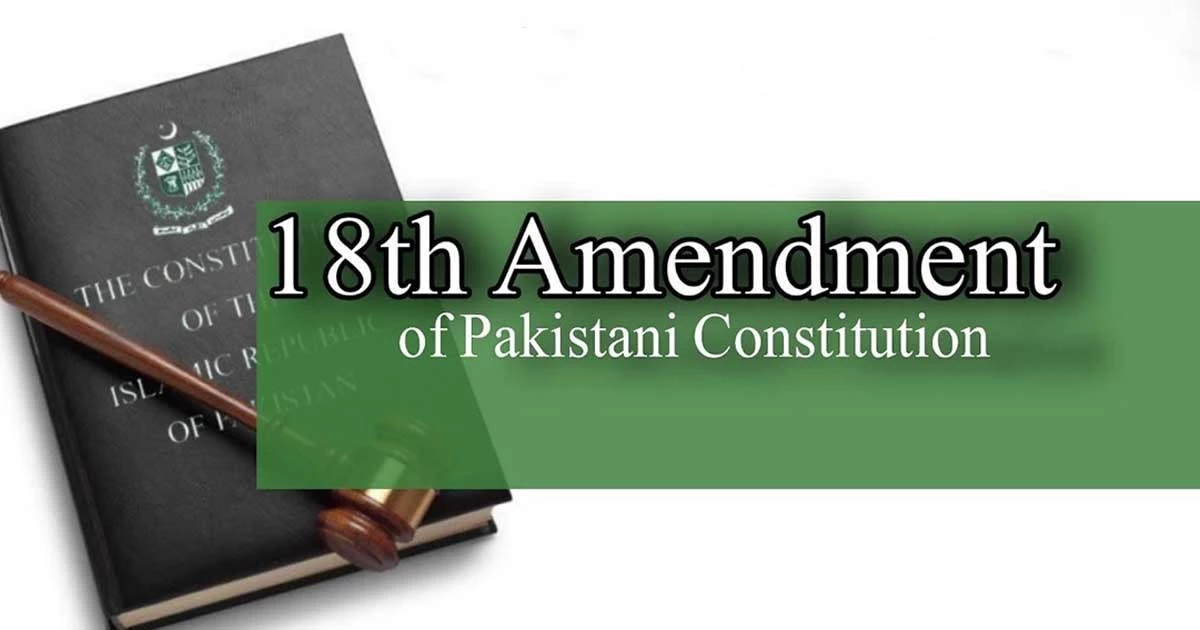Political Opportunism and the 18th Constitutional Amendment

Stay tuned with 24 News HD Android App

The 18th Constitutional Amendment, a landmark achievement towards the distribution of fiscal resources, and delegation of administrative and legislative competencies, keeps on making headlines in Pakistan. The decentralization i.e. distribution of fiscal resources, abolition of the concurrent list, and the entitlement of provinces on the residual subjects, achieved through the historic parliamentary endeavour addressed much of the concerns of the constituting units of the Pakistani federation. However, the parties whether with or eyeing the control of the centre express their wishes to get done with the amendment while the nationalist and regional political parties from the peripheral areas, in response, vow to protect the constitutional guarantees that the aforementioned amendment provided.
The amendment in the Constitution of the Islamic Republic of Pakistan, as explained in Chapter Xi of the Constitution, is a relatively rigid phenomenon that requires the support of two-thirds of the membership in both Houses of the Majlis e Shoora, the Parliament. The voting on such amendment is through open voting and requires strict adherence to the Parliamentary party directions; those diverging may face disqualification on the ground of defection under Art 63-A.
Earlier this week, Dawn, citing a source within the party, reported that the Pakistan Muslim League (Nawaz) is aiming to axe the 18th Constitutional Amendment, not as a whole but a few parts of it at least. The suggestions received by the recently constituted PMLN manifesto committee aim at reformulating the distribution of fiscal resources, and ultimately, changing the dynamics of the centre and provinces’ shares, the source revealed. These reports, though denied through a statement issued by Ms. Marriyum Aurangzeb, the Secretary of the Manifesto Committee, align with the assertions made by another senior party leader Khawaja Saad Rafique after a meeting held with a delegation of Muttahida Qaumi Movement-Pakistan in Karachi earlier this month. Mr. Rafique hinted toward constitutional reforms aiming at protecting the local governments and making the constitution more “people friendly”.
However, such calls are not new to the political pundits. During his premiership earlier, Imran Khan’s criticism of the 18th Amendment had garnered much uproar and feelings of antagonism among the federating units. Pakistan Peoples’ Party, which takes credit for the passage of the amendment, vowed to protect it at any cost, both then and now. Significantly and interestingly, neither PMLN nor PTI had the required numbers in their respective tenure. Now, the question arises, whether PML-N shall be able to require the two hundred and twenty-four seats in the National Assembly in the upcoming general election. However, to collude such a majority seems wishful thinking at the moment whether singularly or by joining the allies in the Parliament esp. from the provinces other than Punjab.
On the one hand, with the general elections in sight, the PDM coalition, be it a collective force or its constituting parties separately, at the moment, lacks both the performance and the narrative to woo the voters toward its polling camps owing to their dismal performance during the 16-month long power stint at the centre. While PMLN did let go of its “Vote ko izzat do” slogan, other parties’ senior leadership keeps on taunting the earlier coalition every now and then. On the other hand, the Pakistan Tehrik e Insaf factor is at play as an overwhelming majority of surveys conducted through different institutes and media channels show the rising popularity of Imran Khan, the PTI chairman, who is currently facing jail time while having more than two hundred FIRs against him.
Amidst the aforementioned political scenario, the revelation of aggressive tendencies vis-à-vis the 18th amendment from sources within the PMLN seems to be aimed at providing the election campaign material for the nationalist, ethnic, and regionalist political parties which otherwise seem to be less popular at the moment than PTI which is battling at many fronts. The disclosure of intent to roll back the amendment is a calculated move to show former coalition partners, demographically spread across the peripheral provinces, pitted against PMLN which largely represents Punjab and is portrayed as in control of the centre, ultimately. In the backdrop of provincialism, such a move shall generate ethnic, and nationalistic apprehensions among the constituents of regional parties which these parties shall appeal to in the upcoming elections.
